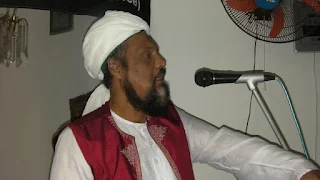An Encounter with the Mullahs in Triolet
On Thursday 20 February 2014, I was in the North of Mauritius in one of its biggest
villages called Triolet. On the way I met two Mullahs coming from Bangladesh.
They presented themselves to me after greeting Salaam, and with very good and
sweet words they invited me in the mosque at about 10:00a.m. I met many other
Muslims coming from Bangalore and India. They asked me my name and before I
have finished giving my full name, when I reached: Munir Ahmad, one of the
Mullahs told me that his Burzuq’s
name is Munir Ahmed, but then when I gave completed my full name: Munir Ahmad Azim, all of them looked at
me with big surprised eyes and they suddenly turned aggressive.
Gone were the good and
sweet words! Their tone changed and they immediately asked me: “You
have proclaimed that you are the Mohyuddin, Khalifatullah etc.”
Without any hesitation and fear to creatures, although they
were in great numbers in the mosques, I
replied them in the affirmative.
They then asked me a
series of questions pertaining to the titles I have received from Allah,
wanting to know who told me that I was the Khalifatullah, Mohyuddin etc. I told
them that it is my Creator, my Rab, in whose hands my life, health, food,
dignity and honour are found. They did not believe me and called me liar
and thus started a debate on the finality of prophethood in which they believe.
Holy Qur’an and the Sunnah as Final Guidance
Among other questions
concerning the Mahdi and Messiah to come, they put to me put a question to me
regarding a Hadith, “I have left
for you the Book of Allah and the Sunnah, if you hold fast to it you will never
go astray.”












